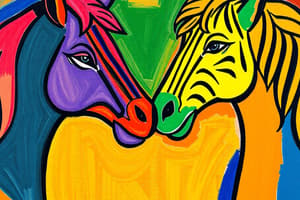Podcast
Questions and Answers
What is the definition of learning?
What is the definition of learning?
- An innate response to a stimulus
- The ability to memorize facts
- The act of performing a task
- The process of acquiring new and relatively enduring information or behaviors (correct)
What is habituation?
What is habituation?
Decreasing responsiveness with repeated stimulation
What is associative learning?
What is associative learning?
Learning that certain events occur together
What is a stimulus?
What is a stimulus?
What is cognitive learning?
What is cognitive learning?
What is classical conditioning?
What is classical conditioning?
What is behaviorism?
What is behaviorism?
What is a neutral stimulus?
What is a neutral stimulus?
What is an unconditioned response?
What is an unconditioned response?
What is an unconditioned stimulus?
What is an unconditioned stimulus?
What is acquisition in classical conditioning?
What is acquisition in classical conditioning?
What is higher-order conditioning?
What is higher-order conditioning?
What is extinction?
What is extinction?
What is spontaneous recovery?
What is spontaneous recovery?
What is generalization in learning?
What is generalization in learning?
What is discrimination in classical conditioning?
What is discrimination in classical conditioning?
What is operant conditioning?
What is operant conditioning?
What is the law of effect?
What is the law of effect?
What is an operant chamber?
What is an operant chamber?
What is reinforcement in operant conditioning?
What is reinforcement in operant conditioning?
What is shaping in operant conditioning?
What is shaping in operant conditioning?
What is a discriminative stimulus?
What is a discriminative stimulus?
What is positive reinforcement?
What is positive reinforcement?
What is negative reinforcement?
What is negative reinforcement?
What is a primary reinforcer?
What is a primary reinforcer?
Flashcards are hidden until you start studying
Study Notes
Learning Concepts
- Learning is the process of acquiring new and enduring information or behaviors.
- Habituation involves decreased responsiveness to repeated stimuli, demonstrated by infants losing interest in familiar visual stimuli.
- Associative learning refers to linking certain events together, such as in classical and operant conditioning.
Key Terms in Conditioning
- Stimulus is any event or situation that triggers a response.
- Cognitive learning entails acquiring mental information through observation or language.
- Classical conditioning allows individuals to learn associations between stimuli.
Types of Stimuli
- Neutral stimuli elicit no response before conditioning begins.
- Unconditioned response (UR) is an unlearned reaction to a natural stimulus.
- Unconditioned stimulus (US) is a stimulus that automatically triggers a response.
Conditioning Processes
- Acquisition is the initial stage in classical conditioning where a neutral stimulus begins to trigger a conditioned response.
- Higher-order conditioning occurs when a conditioned stimulus is paired with a new neutral stimulus.
- Extinction is the reduction or disappearance of a conditioned response when the US no longer follows the CS.
Behavioral Reactions
- Spontaneous recovery is the reappearance of an extinguished conditioned response after a pause.
- Generalization is the tendency to respond similarly to stimuli that resemble the conditioned stimulus.
- Discrimination involves the ability to distinguish between the conditioned stimulus and other stimuli that do not signal a US.
Operant Conditioning
- Operant conditioning strengthens or weakens behavior based on reinforcement or punishment.
- The law of effect states behaviors followed by favorable consequences are more likely to recur.
- An operant chamber is a controlled environment used to study animal behavior with a mechanism for reinforcement.
Reinforcement
- Reinforcement strengthens behavior; can be positive (adding a stimulus) or negative (removing a stimulus).
- Shaping is a process where reinforcers guide behavior toward the desired action.
- Discriminative stimuli signal availability of reinforcement, influencing response occurrences.
Types of Reinforcers
- Positive reinforcement increases behaviors via positive stimuli.
- Negative reinforcement enhances behaviors by eliminating negative factors.
- Primary reinforcers are innate stimuli that satisfy basic needs, strengthening responses upon presentation.
Studying That Suits You
Use AI to generate personalized quizzes and flashcards to suit your learning preferences.




